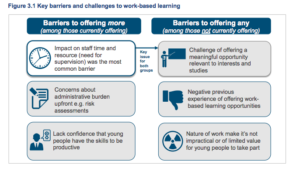Research carried out by IFF and Learning and Work on behalf of the Department for Education was launched yesterday. The report explores interviews carried out with 120 employers.
Key objectives of the study were to explore:
• Employers’ willingness and ability to offer industry placements of 45-60 working days;
• The motivations and challenges to delivering industry placements, and how challenges can be overcome;
• How employers engage with the skills infrastructure and how useful this
• Employers’ willingness to employ young people with T Levels and how these fit with other qualifications, such as apprenticeships; and
• Whether employers’ geographical location affects their ability to offer industry placements.
Download the full report hereThe report indicates that employers overall were happy to hear about the plans and a change for technical education. With many factors still to be explored and decided some of the questions which have previously been raised about access in rural locations, ensuring young people can get placements in their chosen field and employer capacity to deliver work placements, apprenticeships, work experience and valid career routes for school leavers and graduates still need thinking through.
Whilst the report indicates that the biggest group of employers would be willing to to offer placements if a number of questions they had could be answered. A smaller group were unable to confirm their willingness or capacity without being first provided with more information, usually because they lack the track record of delivering work-based learning opportunities and associated understanding of costs and benefits; and a final, small group that report unwillingness or inability to offer placements for capacity issues or a preference for established work-based qualifications such as Apprenticeships.
Recommendations
The research suggests that in order to promote engagement and enable employers to make informed decisions about their capacity to engage with T Level industry placements, the following will need be addressed. Firstly, employers should be given clear information, in order to inform their capacity calculations.
Secondly, the role of the learning provider needs to be clear and must minimise the burden on employers. Employers were keen for learning providers to minimise this burden by: matching young people to an appropriate placement; providing pre-placement preparation and training; and providing ongoing support for both the employer and young person. It is crucial that learning providers are appropriately skilled and equipped to fulfil this role in the way that employers expect.
Finally, to develop and implement T Level industry placements, employer and industry specific considerations should be taken into account. This includes consideration of employer support, particularly for SMEs where the resource requirement for supervision may be acute. There is also a need for particular consideration of routes where there are barriers to providing a ‘meaningful’ placement, such as legal and safety restrictions, or where there are already well-established technical education routes. Addressing these challenges will help bridge the gap between employers’ willingness to engage in T Levels and their capacity and capability to do so.
Offering quality work placements
Young people have been citing a lack of work experience as one of their biggest barriers to employment for a number of years. We welcome the review of technical education and the bringing together of employers, young people and education in a meaningful way but there is still much that remains unclear. The questions employers are still asking at this stage are fair and we all look forward to seeing more of the detail soon so we can fully understand if and how this can work for young people.
The quality and youth friendliness of placements will be a key focus for us as we watch the developments of the T levels. We support employers to review and refine their practices in engaging young people to ensure that they receive a quality experience. Increasing the asks we have for employers to provide work placements, work experience, apprenticeships, entry level and graduate routes for our young people will take help, support and a quality framework sitting behind it for it to succeed. You can read more about ours here.













